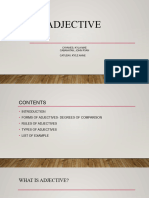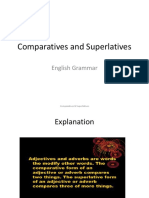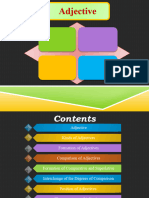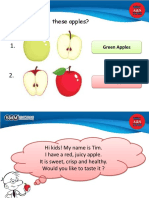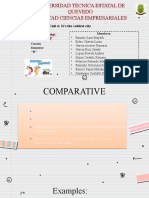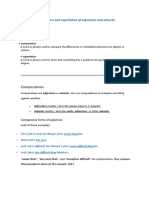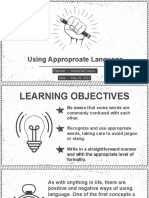Adjective NotesGPSNT
Adjective NotesGPSNT
Uploaded by
Voltaic DCopyright:
Available Formats
Adjective NotesGPSNT
Adjective NotesGPSNT
Uploaded by
Voltaic DOriginal Description:
Original Title
Copyright
Available Formats
Share this document
Did you find this document useful?
Is this content inappropriate?
Copyright:
Available Formats
Adjective NotesGPSNT
Adjective NotesGPSNT
Uploaded by
Voltaic DCopyright:
Available Formats
Class-VI Subject- English (Grammar)
Definition of Adjective
A word which is used with a noun or a pronoun to describe it (description may be of its
type, place, number or amount) is known as an Adjective.
Now, look at following sentences.
1. Ramesh is intelligent.
2. An intelligent boy won the quiz.
1. Descriptive Adjectives or Adjectives of Quality: Among the different kinds of
adjectives, descriptive adjectives are probably the most common ones. They simply say
something about the quality or the kind of the noun or pronoun they’re referring to.
Examples:
● Erika is witty
● She is tired
● Adrian’s reflexes are amazing
2. Adjectives of Number or Adjectives of Quantity: As the name suggests, this kind of
adjective answers the questions, “How many?” or “how much?”
Examples:
● Twenty-one students failed the exam.
● The plants need more water.
3. Demonstrative Adjectives: Demonstrative adjectives point out pronouns and nouns,
and always come before the words they are referring to.
Examples:
● I used to buy this kind of shirts.
● When the old man tripped over that wire, he dropped a whole bag of
groceries.
4. Possessive Adjectives: Obviously, this kind of adjectives shows ownership or
possession. Aside frojn that, possessive adjectives always come before the noun.
Examples:
● I can’t answer my seatwork because I don’t have a calculator.
● Trisha sold his dog.
5. Interrogative Adjectives: Interrogative adjectives ask questions and are always
followed by a noun.
Examples:
● What movie are you watching?
● Which plants should be placed over here?
Degrees of Adjectives
❖ Positive Degree – An adjective is said to be in positive degree, when there
is no comparison.
❖ Comparative Degree – An adjective is said to be in comparative degree,
when it is used to compare between two nouns or pronouns.
❖ Superlative Degree – An adjective is said to be in superlative degree, when
it is used to compare more than two nouns or pronouns.
POSITIVE DEGREE COMPARATIVE DEGREE SUPERLATIVE DEGREE
Beautiful More Beautiful Most Beautiful
Big Bigger the biggest
Black Blacker Blackest
Clean Cleaner The cleanest
Difficult More Difficult The most difficult
Dirty Dirtier The dirtiest
Far Farther/ Further The farthest/ The furthest
Old Older The oldest
You might also like
- EF4e Intplus AK Filetest 8aDocument3 pagesEF4e Intplus AK Filetest 8aKate Nikolina0% (1)
- ADJECTIVES and ADVERBS HANDOUTDocument3 pagesADJECTIVES and ADVERBS HANDOUTJohn Dale AmaguinNo ratings yet
- What Kind? How Many? Which One? How Much? Are A Few Questions That Tell More About An AdjectiveDocument3 pagesWhat Kind? How Many? Which One? How Much? Are A Few Questions That Tell More About An AdjectiveMark Cesar VillanuevaNo ratings yet
- ENG111 Adj Conj PrepDocument22 pagesENG111 Adj Conj PrepjemimaafuapeNo ratings yet
- Lesson Plan of Degrees of AdjectivesDocument4 pagesLesson Plan of Degrees of AdjectivesJoana Marie Bonto100% (1)
- ADJECTIVESDocument10 pagesADJECTIVESg-60192670No ratings yet
- Instructional Material 1Document5 pagesInstructional Material 1fid randebuaNo ratings yet
- ADJECTIVE - Lesson 4Document12 pagesADJECTIVE - Lesson 4DANES CLAUEI GUHITINGNo ratings yet
- Degrees of Comparison PDFDocument4 pagesDegrees of Comparison PDFnafisaislamezaNo ratings yet
- Adjective 2Document158 pagesAdjective 2dhiraj.bokNo ratings yet
- Lesson 1 Degrees of Adjective (1)Document75 pagesLesson 1 Degrees of Adjective (1)Chari NaNo ratings yet
- Best Coaching Center - AdjectivesDocument28 pagesBest Coaching Center - AdjectivesBest CoachingNo ratings yet
- JEE Main, JEE Advanced, CBSE, NEET, IIT, Free Study Packages, Test PapersDocument3 pagesJEE Main, JEE Advanced, CBSE, NEET, IIT, Free Study Packages, Test PapersHiral BhattNo ratings yet
- Proper: Articles Like The, A, and An Are Also Limiting Adjectives Because They Denote Whether A Noun Is Definite orDocument16 pagesProper: Articles Like The, A, and An Are Also Limiting Adjectives Because They Denote Whether A Noun Is Definite orhaniNo ratings yet
- Dr. Eng Jordão Ortega Jemusse ManguenaDocument11 pagesDr. Eng Jordão Ortega Jemusse ManguenajemusseNo ratings yet
- g4 Report AdjectiveDocument24 pagesg4 Report AdjectiveJohn ryan CabanatanNo ratings yet
- Adjective-Degree of ComparisonDocument1 pageAdjective-Degree of ComparisonVoj LeinobNo ratings yet
- Change of DegreeDocument25 pagesChange of DegreeSumon TouridNo ratings yet
- Topic3 AdjectivesDocument39 pagesTopic3 AdjectivesfaizahabdullahNo ratings yet
- Comparatives and SuperlativesDocument33 pagesComparatives and SuperlativesBello Tara AliNo ratings yet
- Degree of ComparisonDocument3 pagesDegree of ComparisonKristiyana Laia100% (1)
- Comparativos y Superlativos Presentacion en InglesDocument18 pagesComparativos y Superlativos Presentacion en Inglesanabmata7399No ratings yet
- Adjectives: Miralu Khana B. Flores and Bethany D. LoyolaDocument71 pagesAdjectives: Miralu Khana B. Flores and Bethany D. LoyolaKhana FloresNo ratings yet
- AdjectivesDocument18 pagesAdjectivesshahammar01272No ratings yet
- Adjectives 1Document11 pagesAdjectives 1Ishaq KhanNo ratings yet
- All Kinds of AdjectiveDocument33 pagesAll Kinds of AdjectiveChea DavitNo ratings yet
- Lesson 4-Tangmuan, Wenie RoseDocument15 pagesLesson 4-Tangmuan, Wenie Rosewenie rose tangmuanNo ratings yet
- ENG3 4thquarterDocument45 pagesENG3 4thquarterLee Knee JoiNo ratings yet
- AdjectivesDocument89 pagesAdjectivesjnmkthyderabadNo ratings yet
- Unidad 6Document3 pagesUnidad 6CarlosHernadezNo ratings yet
- 17 Degrees of ComparisonDocument11 pages17 Degrees of ComparisonRamuguhaNo ratings yet
- They Live in A Beautiful HouseDocument6 pagesThey Live in A Beautiful HouseAngellen PabillarNo ratings yet
- Comparative DegreeDocument11 pagesComparative DegreePrabu Nibras Syaria AlfahriNo ratings yet
- Adjectives & AdverbDocument30 pagesAdjectives & AdverbJake Elorde SacendoncilloNo ratings yet
- Adjective-2 0Document66 pagesAdjective-2 0Martha Grace GrengiaNo ratings yet
- Adjective Types: The Adjective in English GrammarDocument15 pagesAdjective Types: The Adjective in English GrammarPadhy ParthosarathiNo ratings yet
- What Colour Are These Apples?Document32 pagesWhat Colour Are These Apples?Cupcakes&KnivesNo ratings yet
- Parts of SpeechDocument35 pagesParts of SpeechTiffany EcclesNo ratings yet
- Edeng 102 - ReviewerDocument22 pagesEdeng 102 - ReviewerRechelle MarmolNo ratings yet
- 06.Adjective bDocument21 pages06.Adjective bHarshit DwivediNo ratings yet
- Degrees of ComparisonDocument28 pagesDegrees of ComparisonAnitha Yala0% (1)
- Unit-7 You'd BetterDocument13 pagesUnit-7 You'd BetterЧулуунбаатар БаасанжаргалNo ratings yet
- Handout On Adjectives and AdverbsDocument5 pagesHandout On Adjectives and AdverbsJoy CelestialNo ratings yet
- Adverb and AdjectiveDocument5 pagesAdverb and AdjectiveMery Rose AdelanNo ratings yet
- Group 4 Adjective 1Document32 pagesGroup 4 Adjective 1Jacob Clint LipuraNo ratings yet
- Unit 12 FRDocument29 pagesUnit 12 FRGilNo ratings yet
- Adjectives and Adverbs - Adjectives and AdverbsDocument11 pagesAdjectives and Adverbs - Adjectives and AdverbsMoise Elena NatiNo ratings yet
- Using The Degrees of Comparison of AdjectivesDocument17 pagesUsing The Degrees of Comparison of AdjectivesDiane Reign MianaguaNo ratings yet
- Comp y SuperDocument15 pagesComp y SuperALISSON IVANNA PINARGOTE BRAVONo ratings yet
- Group 4 - AdjectiveDocument14 pagesGroup 4 - AdjectiveErssaanNo ratings yet
- Degrees of ComparisonDocument10 pagesDegrees of ComparisonBuataplikasi AjaaaNo ratings yet
- Adjectives 1Document19 pagesAdjectives 1Avinash VishwakarmaNo ratings yet
- AdjectivesDocument16 pagesAdjectivesTechnical InformationNo ratings yet
- Parellel StructureDocument16 pagesParellel Structureida susilaNo ratings yet
- Adjectives (Level 1) - Study NotesDocument23 pagesAdjectives (Level 1) - Study NotesDEEPAK SINGHNo ratings yet
- Atayeva Guljemal Adj - VideoDocument18 pagesAtayeva Guljemal Adj - VideoGüljemalNo ratings yet
- Comparatives and SuperlativesDocument6 pagesComparatives and SuperlativesLo RaveNo ratings yet
- AdjectivesDocument15 pagesAdjectivesHaniah HumamNo ratings yet
- Unit 1 - Grammar HandoutDocument4 pagesUnit 1 - Grammar HandoutmayaNo ratings yet
- Amanti & Imani Slam Dunk Lazy Talk Mini Dictionary:: Who's Yo Author?From EverandAmanti & Imani Slam Dunk Lazy Talk Mini Dictionary:: Who's Yo Author?No ratings yet
- Word Trippers 2nd Edition: Your Ultimate Source for Choosing the Perfect Word When It Really MattersFrom EverandWord Trippers 2nd Edition: Your Ultimate Source for Choosing the Perfect Word When It Really MattersNo ratings yet
- Lesson Plan Design Technology Grade 2Document2 pagesLesson Plan Design Technology Grade 2TIMONo ratings yet
- Business Comminucation Cha.2Document41 pagesBusiness Comminucation Cha.2Tahir KasimNo ratings yet
- Speaking Activities in Young Learners Classroom: The Implementation of Project-Based Learning ApproachDocument13 pagesSpeaking Activities in Young Learners Classroom: The Implementation of Project-Based Learning ApproachFirda Maharani AneskiNo ratings yet
- Análisis Sociolinguiéstica.Document39 pagesAnálisis Sociolinguiéstica.F. Andrés Correa MorenoNo ratings yet
- Lesson Plan in English Vii: Lunen IntegratedDocument3 pagesLesson Plan in English Vii: Lunen IntegratedJessa RamosNo ratings yet
- ELE 101 Assignment 3Document2 pagesELE 101 Assignment 3Johndel FellescoNo ratings yet
- Understanding of The Importance of Mother Tongue LearningDocument4 pagesUnderstanding of The Importance of Mother Tongue LearningEditor IJTSRDNo ratings yet
- TKPPF enDocument2 pagesTKPPF enarijul89No ratings yet
- EF4e Uppint Filetest 03a Answer SheetDocument1 pageEF4e Uppint Filetest 03a Answer SheetNik GerNo ratings yet
- Tələffüz Vərdişləri Imtahan Sualları PDFDocument20 pagesTələffüz Vərdişləri Imtahan Sualları PDFY CabbarovaNo ratings yet
- Media and Information LiteracyDocument20 pagesMedia and Information LiteracyEicelle Rein ParumogNo ratings yet
- AEC SYLLABUS Sem I&IIDocument22 pagesAEC SYLLABUS Sem I&IIAshok MewadaNo ratings yet
- PROJECTOR PLAN Week 6-15Document18 pagesPROJECTOR PLAN Week 6-15mediatrix trinidadNo ratings yet
- Communication Quiz QuestionDocument42 pagesCommunication Quiz QuestionJani Arun Augustin RajaNo ratings yet
- English Class 10th West Bengal BoardDocument3 pagesEnglish Class 10th West Bengal BoardSuresh Prasad RawaniNo ratings yet
- PT3-ESSAY Descriptive Abt Snatch TheftDocument9 pagesPT3-ESSAY Descriptive Abt Snatch TheftJayalalidha VesovalingamNo ratings yet
- Gregg ShorthandDocument4 pagesGregg ShorthandRosemarie HerreraNo ratings yet
- What Are The Types of Reading in EnglishDocument1 pageWhat Are The Types of Reading in EnglishMelody Aurelio SinenteNo ratings yet
- Project 3 Public CommunicationDocument9 pagesProject 3 Public Communicationshirjan.0.khadkaNo ratings yet
- WEEK 3 Resources ForDocument10 pagesWEEK 3 Resources ForHanoveraNo ratings yet
- 02 11Document2 pages02 11Anastasia MialoNo ratings yet
- The Effect of Repeated Reading Strategy On Oral Reading Fluency oDocument91 pagesThe Effect of Repeated Reading Strategy On Oral Reading Fluency oVi Nguyen TuyetNo ratings yet
- Al-Tamasuk Al-Nassi Wa Dauruhu Fi Intaj Al-DilalahDocument24 pagesAl-Tamasuk Al-Nassi Wa Dauruhu Fi Intaj Al-Dilalahسيف مصقولNo ratings yet
- Ad ReflectionDocument2 pagesAd ReflectionSebastian MonteroNo ratings yet
- ENGLISH 105: Teaching and Assessment of Macro Skills: Posture of The Power of VoiceDocument4 pagesENGLISH 105: Teaching and Assessment of Macro Skills: Posture of The Power of VoiceChercy EugenioNo ratings yet
- Coding DecodingDocument5 pagesCoding DecodingThomas JoseNo ratings yet
- Multilingual Education in OdishaDocument14 pagesMultilingual Education in OdishaPratyush kumar pradhanNo ratings yet
- Using APpropriate LanguageDocument25 pagesUsing APpropriate LanguageVerna Dell CorpuzNo ratings yet
- CH 20 - The Marketing Mix - Promotion and Place - PresentationDocument148 pagesCH 20 - The Marketing Mix - Promotion and Place - Presentationkuziva.jamesNo ratings yet















